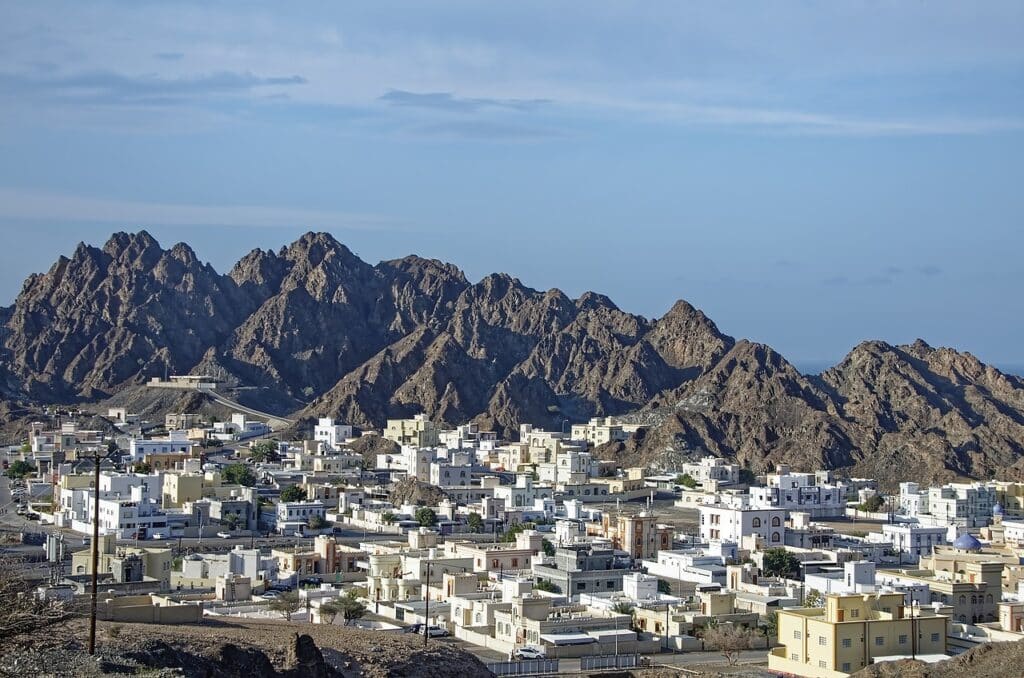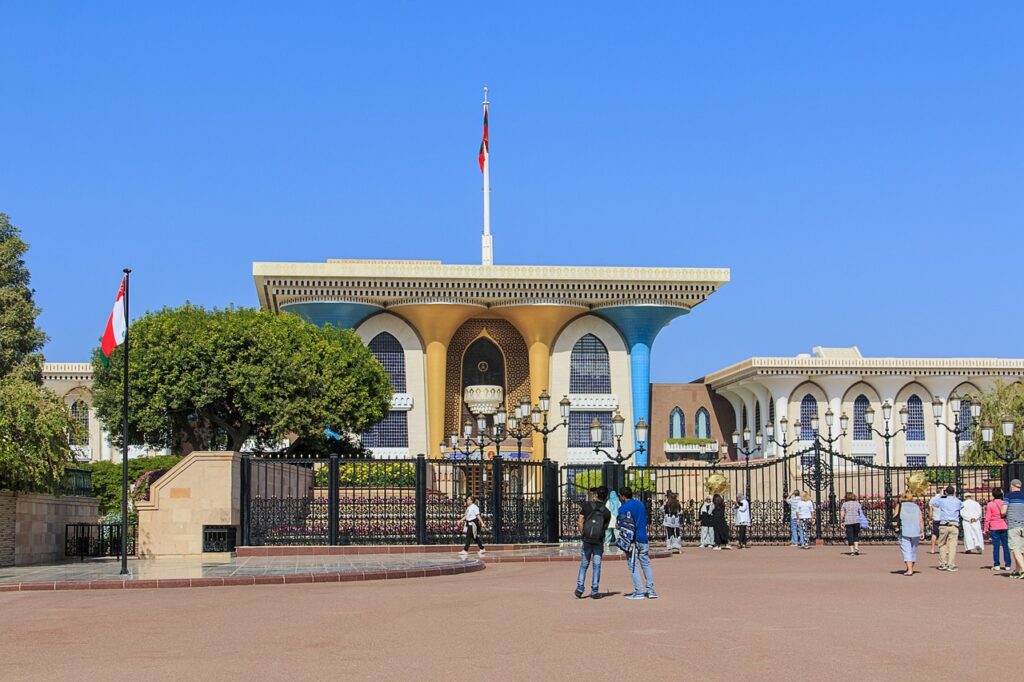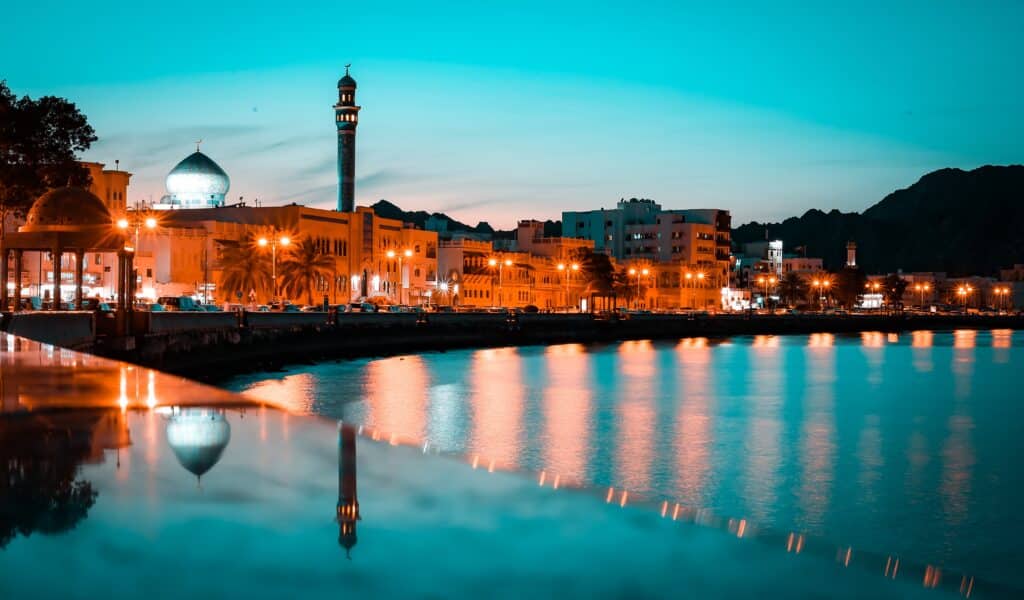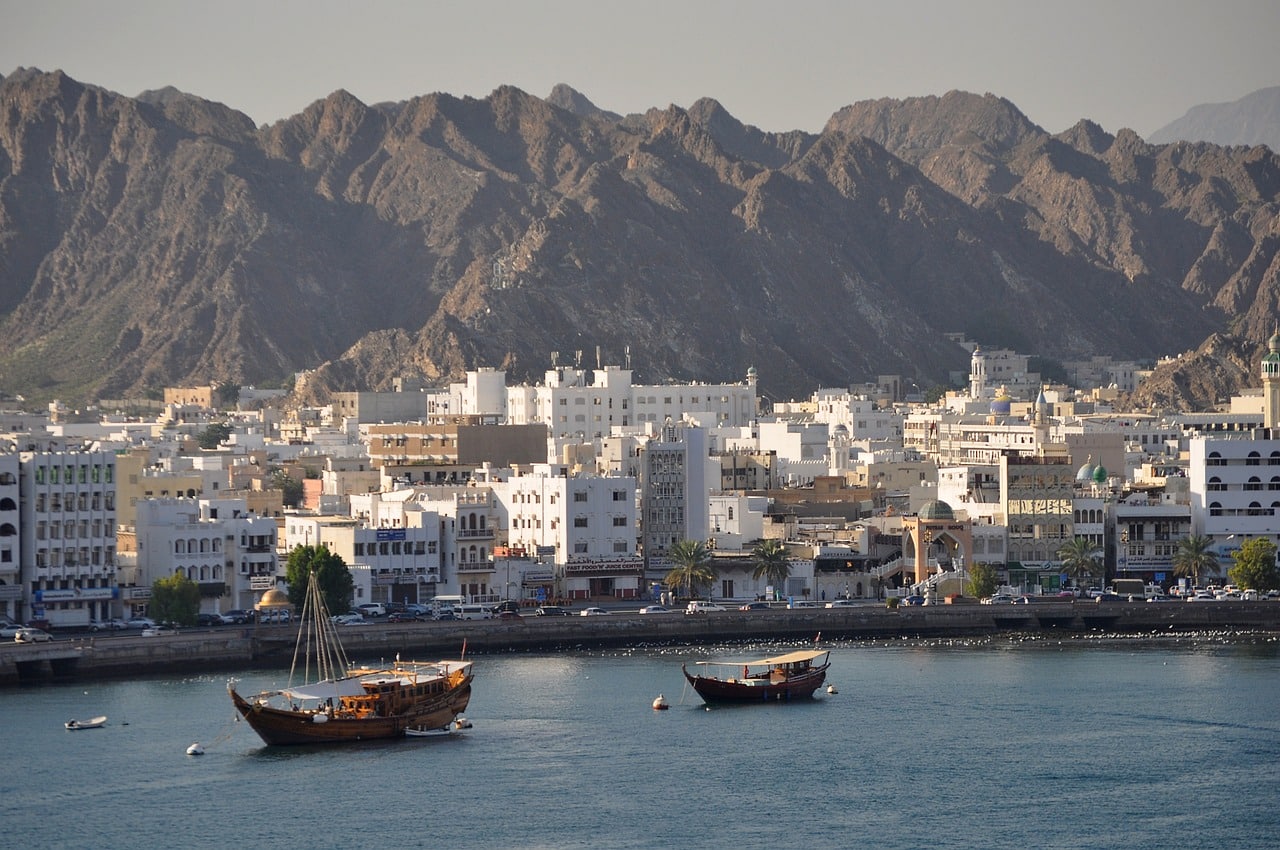Ready to set sail to the South-East of the Arabian Peninsula? Your new life begins on the coast of the Gulf of Oman, in one of the oldest cities in the Middle East! The capital of the Sultanate of Oman is home to many expatriates who enjoy working in a spectacular living and working environment that easily blends tradition with modernity.
From the benefits of living in Muscat to the best neighbourhoods to settle in, Foyer Global Health offers you a guide to help you navigate your new life in Muscat!
Living in Muscat: the (many) advantages & (few) disadvantages
The pros
- Compared to Dubai, Muscat is an authentic and traditional Gulf city.
- The hospitality and generosity of the Omani people help to create a friendly environment
- A spoiled-for-choice environment featuring pristine beaches, surrounding mountains and desert and expansive wadis, Muscat is ideal for a wide range of outdoor activities
- Muscat is one of the safest cities in the Middle East
- It’s very easy to connect with people and build a local network
- Tax benefits
- An enviable quality of life
The cons
- Administrative complexities and delays
- High cost of living
- Changing jobs is very complicated
- Extreme summer temperatures
Moving to Muscat…
As a woman (alone)
It’s perfectly possible, and safe, to move to Muscat as a single woman. In fact, the Omani capital is a great place to network, offering great professional and… social opportunities! Like male colleagues, female expatriates must respect the country’s social codes and customs, particularly regarding dress and behaviour in public places. Even in Muscat, Omani society is conservative, and it is important to show respect and modesty.
However, there is no need to wear the abaya as in Saudi Arabia: loose clothing is sufficient in public places while in beach clubs, the dress code is more relaxed.
Oman is also one of the safest countries in the region, which is reassuring when you choose to move there as a single woman.
… As a family
Childcare for young children: In Muscat, the most common options for looking after young children (aged 0-3/4) are nurseries (most of which are private and not free) and nannies. The Omani capital is home to a number of international private nurseries, many of which are English or Arabic-English bilingual, offering a variety of early-learning and teaching methods. These include Art of Living Nursery, TLC, Little Gems and the National Nursery Montessori. Some companies offer childcare services at work or financial assistance to help with childcare costs for their employees.
Education
Most expats choose to enrol their children, between the ages of 3 and 18, in international schools. There are several options in Muscat, depending on the desired language(s) of instruction and programme(s). The British School, the Lycée Français de Muscat, the American British Academy (ABA) or The American International School of Muscat (TAISM) offer a multicultural learning environment of excellence from kindergarten to grade 12.
1001 family activities
Muscat and the Sultanate of Oman offer a wealth of activities for the whole family, either outdoors or indoors! Take a boat trip to the Daymaniyat Islands, sleep under the stars in the Wahiba Sands desert, relax on Al Bustan Beach or explore Sultan Qaboos City Park… There are so many ways to have fun in Muscat!
Finding accommodation in Muscat
Apartments, houses or villas… The accommodation options you’ll find in Muscat are generally modern, well maintained and varied. Some are located in secure compounds equipped with swimming pools and tennis courts.

Often employers/sponsors support their expat employees’ move and offer company accommodation upon arrival. These benefits are generally included in work contracts. However, if you don’t have this kind of support included in a work package, you can use an estate agent, contact expatriate networks or look at property advertisements.
In Muscat, as in the rest of the country, leases are often for one year and you should plan to pay several months’ rent in advance when you sign the contract.
It is also entirely possible to buy property in Muscat. In fact, to attract foreign investors, the Omani government has set up real estate enclaves called Integrated Tourism Complexes (ITCs) where foreigners can become property owners.
Which neighborhoods offer the best options for expats?
- Madinat Al Sultan Qaboos (MSQ) or ‘Little Britain’ is a charming, green and peaceful district that is very popular with Western expatriates. It is home to opulent villas with gardens and modern apartments. The British School and the ABA are close by. MSQ’s rents here are quite high.
- Al Ghubrah and Al Bowshar: This large area stretching from the beach to the mountains is home to shopping malls, leisure centres (Dolphin Village) and the Muscat Private Hospital. It is close to numerous businesses and the Sultan Qaboos motorway. Housing prices, especially for villas and apartments, are quite affordable.
- Al Qurum (or Qurm): Located on the coast, this is one of the most sought-after neighbourhoods (and not one of the cheapest) areas close to the beach. Al Qurum is home to a large green space, a mix of residential buildings and luxury villas, as well as numerous shops.
- Al Qurum Shatti: With the beach just a stone’s throw away and delicious restaurants and cafes nearby, ‘Al Qurum Beach’ is one of the most affluent and expensive neighbourhoods, with some beautiful beachfront villas.
- Al Azaiba: This is a residential area close to beautiful beaches and a few supermarkets where life is good. It is becoming increasingly popular with expatriates and the beautiful villas here are highly sought after.
- Al Mouj (formerly The Wave) is an upmarket area popular with expat families who prefer life in gated communities. The complex is home to restaurants and hotels, and the beach is the gateway to many water sports activities!
- Al Hail/Seeb: Further away from the city centre, this fast-growing neighbourhood offers more affordable accommodation and includes parks, a large shopping centre and an international school.
Working in Muscat
Most expats living in Muscat have moved there for professional reasons. As the government seeks to diversify and boost the country’s economy, the Sultanate of Oman has seen an increase in the number of foreign workers, both employees and contractors, particularly in the energy, construction, trade, tourism and healthcare sectors.
… as an employee
It is essential to find a job before you move, obtain a work visa and a sponsor. These are prerequisites for working in Muscat. Your employer is your sponsor allowing you to work in the country. You will therefore probably need to sign your employment contract before moving to Oman. Make sure that all details relating to your remuneration: income, date, method of payment and benefits are included in your contract!
To find a job, you can use the services of an international recruitment agency, contact local international companies and/or use expatriate networks (networking is very important in Muscat and Oman).
While the presence of foreign workers in the Sultanate is nothing new, the government has undertaken a number of reforms in the field of employment and, in recent years, has embarked on a process of ‘Omanisation’. As a result, certain jobs are reserved for nationals of the country, and there are fixed quotas for the recruitment of foreign workers in the private sector.
The working week is set at 45 hours, which can be reduced to 30 hours for Muslims during Ramadan.
Important note:
- Labour law is quite strict for expatriates. Indeed, if you want to change jobs, you must get permission from your previous employer, who will provide you with a ‘No objection certificate’. If they refuse, you will have to leave the country and find a new employer who will provide you with a new sponsor and a new work visa.
- Fluency in English is essential for working in Oman as an expat.
… as an entrepreneur
In recent years, the Omani government has taken steps to make the sultanate more attractive by diversifying its economy. Since January 2020, when the New Foreign Capital Investment Law (New FCIL) came into force, foreign investors are permitted to set up their own companies which they own outright without the need for an Omani partner.
In addition, advantageous free trade zones for foreign investors which, combined with a flexible tax environment (15% corporate tax and 5% VAT), are attracting strong interest from foreign investors.
If you are interested in setting up a business in Oman, check out the ‘Invest Easy’ online business portal run by the Ministry of Commerce, Industry and Investment Promotion.
Daily life in Muscat
Cost of living, standard of living and taxation
Although the cost of living in the Omani capital is not as high as in Dubai and is more advantageous than in other Gulf countries, certain expenses such as housing and education are significant. Nevertheless, as expats’ incomes are generally higher than the Omani average (€1,568.02), it is possible to enjoy a high standard of living, especially as taxation in Oman is particularly attractive with no income tax for individuals.
For more information on the cost of living in Muscat and Oman in general, visit our guide!
Is Oman a dangerous country?
The Sultanate of Oman is one of the safest countries in the Middle East. The crime rate is very low, the country is politically stable, and the laws are quite strict and respected. The thing to beware of (as in many other countries…!) is road accidents, especially outside urban areas.

Getting around
Although there is public transport (bus) in Muscat, cars remain by far the most popular mode of transport for expatriates, who can either buy their own vehicle, hire a private driver or take a taxi.
Your health in Muscat
Today, the Omani health system offers efficient, high-quality medical services in modern, well-equipped health facilities, especially in Muscat. In particular, the private sector has expanded rapidly in recent years to cater to the growing population, and it is precisely these health facilities that expatriates should turn to first. The public sector is only accessible to expatriates in case of emergency or if the type of medical care needed is not available in the private sector.
While expatriates benefit from basic healthcare coverage through their employers, most take out private international health insurance to get better protection against healthcare costs, which can quickly escalate in the private sector.
The best healthcare facilities in Muscat, renowned for their excellent medical services, modern infrastructure and highly qualified staff, are : The Royal Hospital, Muscat Private Hospital (MPH) , and Burjeel Hospital.
Find out more about Oman:
Some Destination Guides
-
 Guides for
Guides forOman
